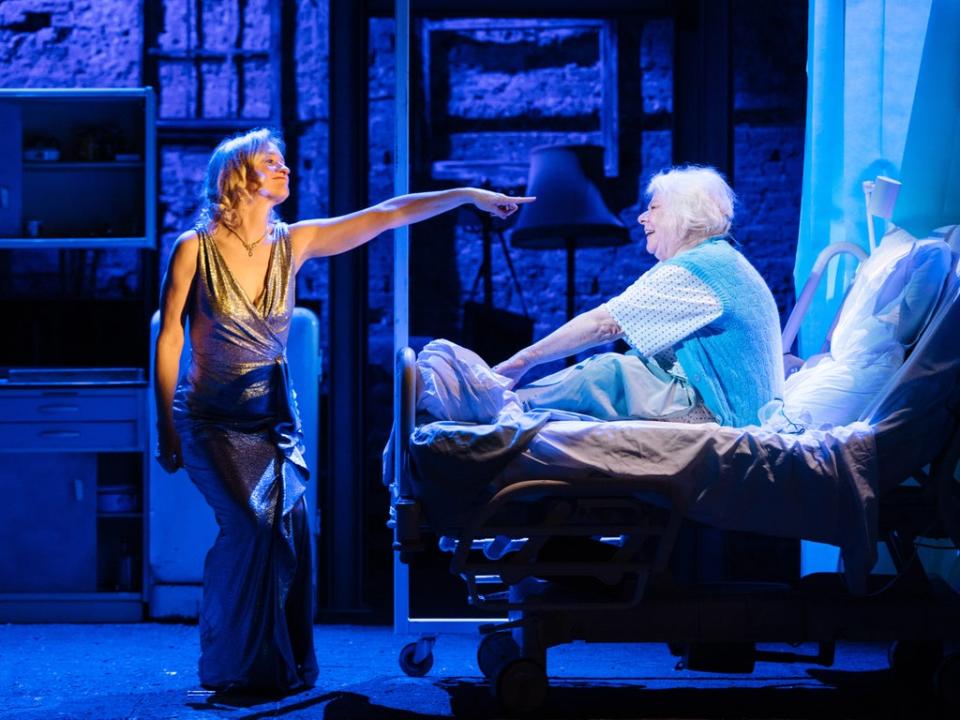The House of Shades review: Beth Steel’s epic working-class family drama is full of proper politics

There’s something nostalgic about The House of Shades. Not just because Beth Steel’s heavyweight saga about a working-class family feels tied to a tradition of old-fashioned, muscular social dramas. But because it’s full of arguments about politics. Proper politics. Ideas. Philosophy. Oh, how wistful I felt for days when we didn’t only argue about the basic moral integrity of those in political office.
In Steel’s play, spanning 1965 to 2019, those arguments take place around the Webster family’s kitchen table. The play is set in a terraced house in Nottinghamshire, where several generations live under one roof; there’s always a battle going on. Constance (Anne-Marie Duff) bickers with her exasperated husband Alistair (Stuart McQuarrie), while their three children try to defuse the tension. Edith (Carol MacReady), Constance’s grandmother, wears black in mourning for her husband – but the memory of his abuse is a lingering shadow.
The Webster’s street is their index for the world; it’s observed that the only Conservative on the street happens to be the one person who has a car. Debates rage about inflation, depreciating wages, and whether the Labour Party is really socialist – all persistently topical. In the background is the haunting figure of Constance’s daughter Laura, who dies midway through a shameful underage pregnancy.
Duff is on spectacular form as Constance, the family matriarch. Dreaming of a life beyond motherhood and household drudgery, she slinks about quoting Bette Davis to blank faces. She spews volcanic fury whenever she remembers her reality. “I’m not working-class, thank you,” she snaps at one point, preferring to think of class as a mindset rather than tangible economic limitations. There’s no kindness left in her marriage. As daughter Agnes, Kelly Gough brings sharp clarity to a socialism forged by exclusion rather than ideals.
At almost three hours, the play can feel unwieldy. Blanche McIntyre’s direction allows us to see the unhurried rhythms of family life, but this sometimes has the effect of slowing things down. Some of the bolder flourishes – a hammily delivered narrator who frames the action; a ghostly encounter with Nye Bevan – don’t come off. It’s at its most confident and compelling when unpicking the tension between feminism and socialism.

Constance rolls her eyes at how fighting for “the people” tends to mean the men. When her husband suggests she hasn’t had to sacrifice anything, he can’t begin to fathom her more existential yearning for visibility and purpose. And her fears for her daughter’s teenage pregnancy aren’t just based on shame – she knows it would drag her back to the burden of motherhood, one she thought she’d escaped. A shocking twist reveals the lengths she’ll go to for self-preservation. This whole through-line is electric – but sometimes feels crowded out by the sheer number of other themes.
Steel, the daughter of a coal miner, said she wasn’t surprised by the Brexit vote – her home county voted 70 per cent to leave. Her background – still depressingly rare in theatre – means she knows what she’s talking about. She’s perceptive of the left’s sense of martyrdom and the bitterness towards those seen to move beyond their class, but she’s also unflinching about the clinical individualism of the right. Her ambitious state-of-the-nation play tugs us in many directions as it asks why we are where we are. She’s a thinker, but also a fighter – I kept thinking how fortunate we are to have a writer like her. Bring on the old-fashioned arguments.
‘The House of Shades’ runs at the Almeida until 18 June

